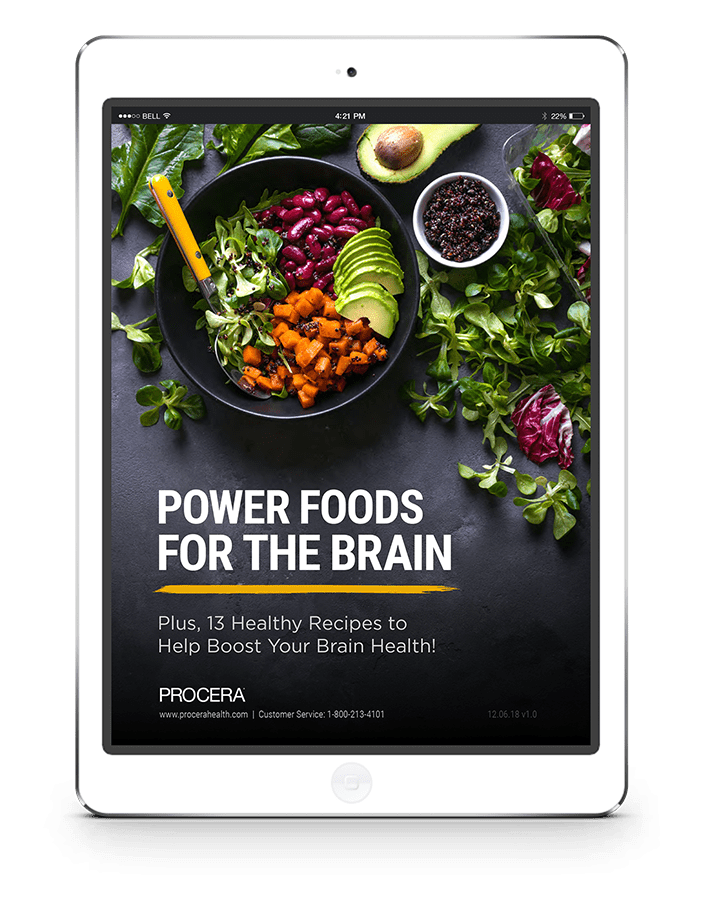
It has become quite clear that eating plant foods like fruits, vegetables and whole grains is very beneficial to our health. That’s in part why Procera Health recommends the Mediterranean Diet. New research findings suggest that a type of compound found in certain plants called flavonoids can increase blood flow to the brain and improve our cognitive function. So what are flavonoids?
What Are Flavonoids?
Flavonoids are a specific type of compound found in plants. The general classification of flavonoid encompasses a large family of over 5,000 compounds that share a similar chemical structure. Within that larger group, there are six subclasses of flavonoids, including anthocyanins, flavonols and flavanones. We consume flavonoids in our diet when we eat various plant foods and certain drinks like fruits, vegetables, and tea. They help to provide the bright coloration to many of these foods, like berries for example.
The Science Behind Flavonoids
Researchers became interested in the benefits of flavonoids for human health in the 1990’s, and since then a large body of scientific evidence has grown that has helped us to better understand their effects. In the human body, flavonoids can have a wide variety of benefits, from acting as antioxidants to altering cell-signaling pathways. Flavonoids have been shown to reduce inflammation, improve insulin and blood sugar responses and improve brain health.
One of the powerful effects of flavonoids on human health is their potential to increase cognitive function and protect our brains from harm. New research published in the last year has helped us better understand why: they can help improve blood flow to the brain.
What is cerebral circulation?
Circulating blood supplies your brain with the oxygen and nutrients it needs to function properly. Although your brain is a small part of your body’s total weight, it requires a lot of energy to function. A three-pound adult human brain consumes about a fifth of the body's energy, yet it cannot store energy on its own and requires constant nourishment from the cardiovascular system. The organ's energy needs fluctuate greatly depending on neural activity, and sufficient blood must be delivered to the right place at precisely the right time to ensure healthy brain function. When this circulation is impaired, your brain can become damaged.
How does blood flow through your brain?
The four main arteries that supply blood to your brain are the left and right internal carotid arteries and the left and right vertebral arteries. These arteries connect and form a circle at the base of your brain. Smaller blood vessels also branch off from these arteries to nourish different sections of your brain. Your brain also has venous sinuses. These types of veins carry blood containing carbon dioxide and other waste products away from your cranium. Some of them connect with the veins of your scalp and face. Nutrient and waste exchange occurs across the blood-brain barrier. This barrier helps protect your brain.
New research links flavonoids to improved blood flow in the brain
In a November 2020 study published in the journal Scientific Reports, researchers looked at what happened to the brain of 18 healthy adults when they ingested flavonoids from cocoa. The results showed that after consuming the flavonoid-rich cocoa, the participants’ brain oxygenation responses were stronger and faster than without the flavonoids. The researchers believe that the flavonoids specifically increased blood flow to the frontal cortex, an area of the brain that is involved in planning and decision making.
Additionally, the participants performed better on cognitive tasks that challenged their brain function when they ingested the flavonoids. For example, they were able to correctly solve problems 11% faster than they did without the flavonoids. This is just the latest in many studies that have helped us to better understand the positive effects of flavonoids on brain function.
How to get more flavonoids in your diet
If you really want to boost your brainpower, one of the best choices you can make is to eat more real foods that are packed with vitamins, minerals, antioxidants, and countless other phytochemicals to nourish your brain cells. Consider this: people who eat plenty of vegetables and fruits (about 1.6 cups, or 400 grams) a day perform better on cognitive tests, while those who eat a lot of sugar are 1.5 times more likely to develop mild cognitive impairment than those who do not.
Researchers at Harvard Medical School suggest eating plant-based foods as much as possible, choosing a wide variety of colorful foods, and aiming for five to nine servings of fruits and veggies per day. The Mayo Clinic says you should “diversify your plant portfolio” and along with flavonoid-rich foods you should add plant foods like avocados, watermelon, dark leafy greens, beets, whole grains, legumes, fatty fish, olive oil, nuts, sesame seeds, and rosemary to the list of foods that support your brain health. Some foods high in flavonoids include berries, tea, cocoa, apples, citrus fruit, celery, red wine, pecans, kale, spinach and oregano.
Celery may be particularly beneficial, it's also a rich source of luteolin, a plant compound that may calm inflammation in your body. Luteolin has also been linked with lower rates of age-related memory loss and higher scores on learning and memory tasks in lab studies. In addition to celery, peppers and carrots are also good sources of luteolin.
If you are looking for a convenient and more immediate way to boost your blood flow (and brain health), you may also want to consider Procera products that boost blood flow are Procera AVH, Procera Advanced Brain and Procera Memory Support at https://procerahealth.com/collections/all-products.








.png?width=1350&name=Procera%20Logo%20W%20Tagline%20White%20(3).png)
Comments
Add Comment